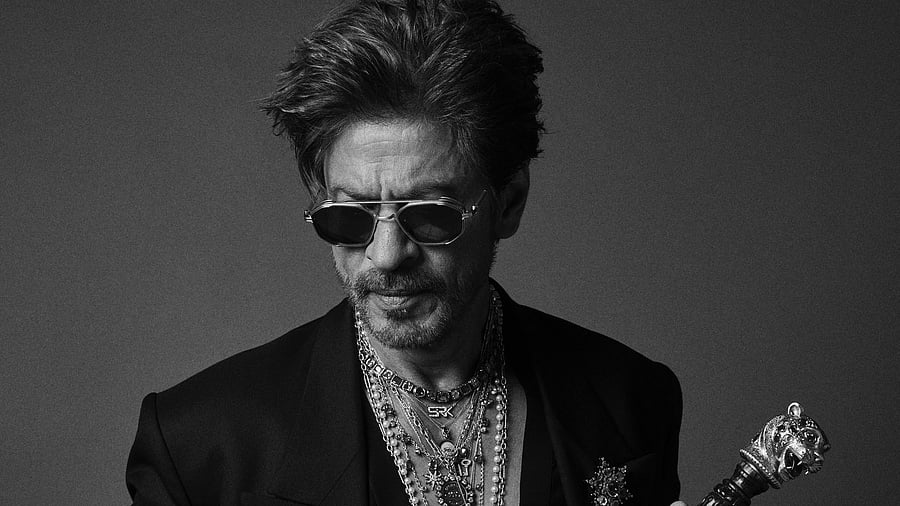
Bollywood star Shah Rukh Khan
Credit: X/@iamsrk
Shah Rukh Khan winning the national award for best actor for ‘Jawan’ has left film buffs intrigued and amused at the same time.
He has never been honoured with the award for some of his best performances in the past. Career-defining performances, such as the ones in ‘Swades’, ‘Chak De! India’, ‘My Name is Khan’ and ‘Kabhi Haan Kabhi Naa’, had gone unnoticed.
Shah Rukh’s performance in ‘Swades’, especially, has been widely discussed, especially the two-minute train scene, which many believe is his greatest onscreen moment ever. The year ‘Swades’ was in contention, Saif Ali Khan got the award for ‘Hum Tum’. Directed by Ashutosh Gowariker, ‘Swades’ (2004) makes a strong case for women’s education and gender equality and denounces caste discrimination.
While Shah Rukh’s win this year may look like poetic justice, what is curious is that it has come for an anti-establishment film. In 2023, after a four-year hiatus, Shah Rukh made a comeback with three films, ‘Pathaan’, ‘Jawan’ and ‘Dunki’. While ‘Pathaan’ was about a RAW agent and ‘Dunki’ about illegal immigration, ‘Jawan’ called out the government for unfair tax practices and poor infrastructure in government hospitals.
The film, in the context of his son Aryan Khan’s arrest, also has a massy dialogue — ‘Bete pe haath lagane se pehle, baap se baat kar’ (‘Before you lift a hand against the son, talk to the father’). It taunts those who hauled up his son in a drugs case, and who they are is no secret. After spending 26 days in jail, Aryan came out — the court acquitted him on grounds of insufficient evidence. ‘Jawan’ ends with Shah Rukh’s character telling the people to choose their leaders wisely. The film came out just a few months before the 2024 Lok Sabha elections.
However, this was not the first time Shah Rukh’s films had called out the government or delivered a socio-political commentary. Samvartha Sahil, who teaches screenplay writing at FTII’s Centre for Open Learning, recalls how the 2001 historical film ‘Asoka’ came just three years after the nuclear weapon tests at Pokhran.
Of all the historical characters he could have played, he chose to portray the Mauryan emperor Ashoka, who, after the brutal Kalinga war, was drawn towards Buddhism, eventually becoming a patron of peace and ahimsa. The film was made under Dreamz Unlimited — now known as Red Chillies Entertainment — co-owned by Shah Rukh, Juhi Chawla and director-screenwriter Aziz Mirza back in the day.
In fact, the banner’s first film, ‘Phir Bhi Dil Hai Hindustani’, with the two actors playing TV reporters, exposed the ugly connection between politicians and the media. The film was a satirical triumph but did not do well at the box office. Today, it is considered to have been much ahead of its time.
At the height of his stardom, Shah Rukh did not hesitate to make a point — whether it was about Muslim sportsmen always having to prove their patriotism (‘Chak De! India’) or rising Islamophobia in the wake of 9/11 (‘My Name is Khan’). In ‘Dil Se’, although criticised for glorifying stalking, the film also spoke about the government’s failure to tackle the insurgency in Assam.
While these films spoke about the politics of the time, they still remain relevant — cricketers Mohammed Shami and Mohammed Siraj are constantly questioned about their performances, and the Centre has done little to douse the fires in Manipur.
It is not just about his films being anti-establishment but also his conviction as a peron. Talking about 2005 ‘Paheli’, in an interview, Shah Rukh had stated, “For a woman, the perfect man is only an illusion.”
Critics rue that the national film awards have lost their credibility with movies aligning with the ruling party winning accolades — ‘The Kashmir Files’ (2022) and ‘The Kerala Story’ (2023) being two glaring examples. Now, one can only wonder what twists in the corridors of power got Shah Rukh his first national award this time.